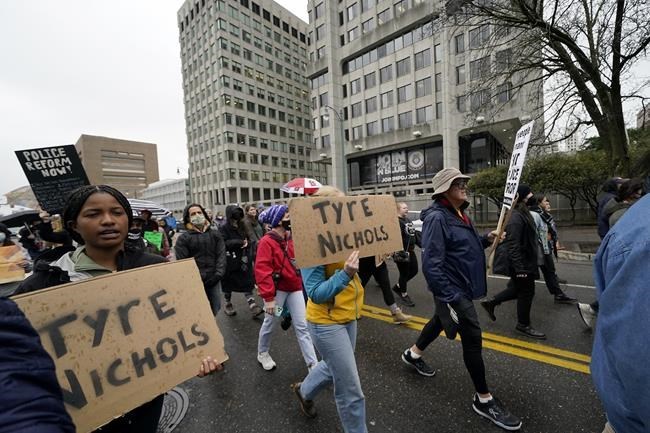Canadian experts and advocates say the firing and charging of the five Memphis, Tenn., officers who beat a Black man to death during a traffic stop suggests there's been societal progress in holding police to account, but also highlights the need for further institutional change.
Authorities in Memphis, Tenn., released footage on Friday of officers holding Tyre Nichols down and striking him repeatedly as he screamed for his mother. After the beating, officers milled about for several minutes while Nichols lay propped up against a car, then slumped onto the street.
Nichols died three days after the Jan. 7 confrontation. The officers, all of whom are Black, were charged Thursday with second-degree murder and other crimes.
Timothy Bryan, an associate professor of sociology at the University of Toronto, said the case highlights the need for more nuanced understanding of the relationship between race and policing.
"One of the things that has always given me pause was that the conversations we were having about race and policing were often conversations about individual racial prejudice of police officers, and the way that those prejudices influenced policing," he said.
"The problem with that kind of conversation is not that it's inaccurate, it's that it's incomplete. That's an incomplete understanding of the relationship between policing and race and racism."
Bryan said he was not surprised that the incident did not spark international protests the way the 2020 killing of George Floyd in Minneapolis, Minn., did, because most of the changes people were calling for were addressed in this case.
"The firing and laying of charges, and getting that entire sort of criminal justice process started probably helped to allay some of the concerns," he said in an interview.
The Canadian Association of Chiefs of Police condemned the actions of the five Memphis officers, saying "leaders across Canada are saddened and horrified by the tragic and unnecessary death" of Nichols.
"As police leaders, we recognize that the actions of these officers will also impact the trust and confidence in policing throughout the United States and Canada—damaging the reputation of a majority of officers who are unwavering in their commitment to public safety," it said in a statement on Thursday.
Fo Niemi, the executive director of the Centre for Research-Action on Race Relations, said Nichols' death illustrates how use of excessive force can undermine public confidence in police departments, and called the CAFC statement "an impressive demonstration of leadership."
"I can't help but praise their sensitivity (and) recognition for police to maintain trust and confidence," he said in an interview.
"I think there's certainly a cultural shift also, at least among many police chiefs in Canada, especially in dealing with minority populations and dealing with the issue of excessive use of force," he said. "That growing awareness is encouraging and hopefully we can bring about change, but we're not there yet."
Niemi said the video footage of Nichols' beating also showcases the need for all officers to wear body cameras, and he is now calling on all departments across Canada to implement them.
"Without body cams, we may not have the level of transparency and accountability that we see here in Memphis and in the United States," he said.
Bryan said that while the CAFC statement was the "right thing to do," it likely is not "reflective of a larger cultural shift in policing."
"You can apologize for them, you can be outraged at them but the underlying architecture of policing is the thing that contributes to these outcomes," he said.
Bryan said one notable aspect of this case is that all the officers are Black men. This, he said, signals the need to focus less on individual racism and more on the institution of policing and the role officers play in society.
"What this incident reveals in a much more stark way is the way in which policing is often not conceived of by police as a service to communities, but rather the enforcement on communities," he said.
"None of that changes just because you change the complexion of officers."
— By Brieanna Charlebois in Vancouver and Marisela Amador in Montreal.
— With files from Associated Press
This report by The Canadian Press was first published Jan. 30, 2023.
Brieanna Charlebois, Marisela Amador, The Canadian Press



